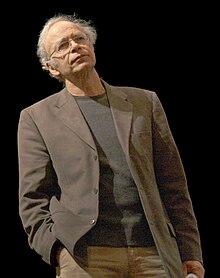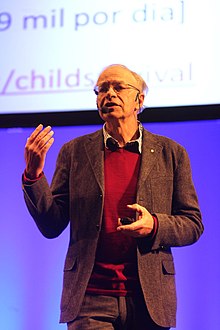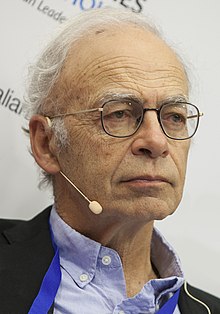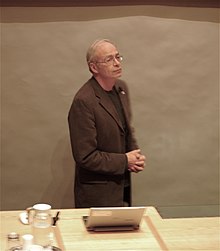Peter Singer
Peter Albert David Singer AC FAHA (born 6 July 1946) is an Australian moral philosopher who is Emeritus Ira W. DeCamp Professor of Bioethics at Princeton University.
After leaving school, Singer studied law, history, and philosophy as a resident of Ormond College at the University of Melbourne, earning a bachelor's degree in 1967.
He was awarded a scholarship to study at the University of Oxford and obtained from there a Bachelor of Philosophy in 1971 with a thesis on civil disobedience supervised by R. M. Hare and published as a book in 1973.
Singer was able to find one book in which he could read up on the issue (Animal Machines by Ruth Harrison) and within a week or two he approached his wife saying that he thought they needed to make a change to their diet and that he did not think they could justify eating meat.
Among the more important human interests are those in avoiding pain, in developing one's abilities, in satisfying basic needs for food and shelter, in enjoying warm personal relationships, in being free to pursue one's projects without interference, "and many others".
[31] As for the Hobbesians, Singer attempts a response in the final chapter of Practical Ethics, arguing that self-interested reasons support adoption of the moral point of view, such as "the paradox of hedonism", which counsels that happiness is best found by not looking for it, and the need most people feel to relate to something larger than their own concerns.
TLYCS was founded after Singer released his 2009 eponymous book, in which he argues more generally in favour of giving to charities that help to end global poverty.
He popularised the term "speciesism", which had been coined by English writer Richard D. Ryder to describe the practice of privileging humans over other animals, and therefore argues in favour of the equal consideration of interests of all sentient beings.
"[40] In 2022, Singer stated that he is not fully vegan because he occasionally consumes oysters, mussels, and clams due to their lack of a central nervous system.
[41] According to Singer, meat-eating can be ethically permissible if "farms really give the animals good lives, and then humanely kill them, preferably without transporting them to slaughterhouses or disturbing them.
Singer himself adopted utilitarianism on the basis that people's preferences can be universalised, leading to a situation where one takes the "point of view of the universe" and "an impartial standpoint".
[54] Singer joined the Australian Labor Party in 1974 but resigned after disillusionment with the centrist leadership of Bob Hawke; in 1992, he became a founding member of the Victorian Greens.
He concludes that game theory (the mathematical study of strategy) and experiments in psychology offer hope that self-interested people would make short-term sacrifices for the good of others, if society provides the right conditions.
Singer has criticized the United States for receiving "oil from countries run by dictators ... who pocket most of the" financial gains, thus "keeping the people in poverty".
[64] He argued against the view that there was no significant difference between Clinton and Trump, whilst also saying that he would not advocate such a tactic in Australia's electoral system, which allows for ranking of preferences.
Singer disagrees with abortion rights opponents in that he does not "think that the fact that an embryo is a living human being is sufficient to show that it is wrong to kill it."
Singer agrees and believes the notion of the sanctity of life ought to be discarded as outdated, unscientific, and irrelevant to understanding problems in contemporary bioethics.
Singer has replied that many people judge him based on secondhand summaries and short quotations taken out of context, not on his books or articles, and that his aim is to elevate the status of animals, not to lower that of humans.
[75] Nazi-hunter Simon Wiesenthal wrote to organisers of a Swedish book fair to which Singer was invited that "[a] professor of morals ... who justifies the right to kill handicapped newborns ... is in my opinion unacceptable for representation at your level.
[79] Singer rejected arguments that legalising euthanasia would result in a slippery slope where the practice might become widespread as a means to remove undesirable people for financial or other motives.
"[87] Singer supports the view that medical intervention into the ageing process would do more to improve human life than research on therapies for specific chronic diseases in the developed world.
The invitation was fiercely attacked by leading intellectuals and organisations in the German media, with an article in Der Spiegel comparing Singer's positions to Nazism.
Singer explains "my views are not threatening to anyone, even minimally", and says that some groups play on the anxieties of those who hear only keywords that are understandably worrying (given the constant fears of ever repeating the Holocaust) if taken with any less than the full context of his belief system.
[90] In an article originally published in The New York Review of Books, Singer argued that the protests dramatically increased the amount of coverage he received, saying that "instead of a few hundred people hearing views at lectures in Marburg and Dortmund, several millions read about them or listened to them on television".
[90] Singer was criticised in 2017 for an op-ed co-written with Jeff McMahan, in which he defends Anna Stubblefield, who was convicted of aggravated sexual assault against D.J., a man with severe physical disability.
They derive their radical moral conclusions from a vacuous utilitarianism that counts the pain and pleasure of all living things as equally significant and that ignores just about everything that has been said in our philosophical tradition about the real distinction between persons and animals.
[100] In June 2012, Singer was appointed a Companion of the Order of Australia (AC) for "eminent service to philosophy and bioethics as a leader of public debate and communicator of ideas in the areas of global poverty, animal welfare and the human condition".
[101] Singer received Philosophy Now's 2016 Award for Contributions in the Fight Against Stupidity for his efforts "to disturb the comfortable complacency with which many of us habitually ignore the desperate needs of others ... particularly for this work as it relates to the Effective Altruism movement".
"[103]: 132 The book states that Singer's "moral philosophy on animal equality was sparked when he asked a fellow student at Oxford University a simple question about his eating habits.
He decided in particular to give half of the prize money to his foundation The Life You Can Save, because "over the last three years, each dollar spent by it generated an average of $17 in donations for its recommended nonprofits".






